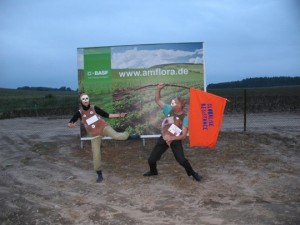GM crops taking over?
 Out of the headlines recently, the Corporates who want to control the food chain have been working way, on both sides of the law.
Out of the headlines recently, the Corporates who want to control the food chain have been working way, on both sides of the law.
Activists concerned about the spread of Genetically Modified Organisms and their increasing use in farms in the UK and Europe are getting very worried, and understandably so.
In the UK, the right-wing coalition government has appointed Caroline Spelman as the Secretary of State for the EFRA (The Environment, Farming and Rural Affairs). Spelman was until last year, director of a company she co-owns with her husband. In a blatant conflict of interests she carries out the DEFRA role whilst having (although slightly less direct than previously) interests in Spelman, Cormack & Associates, their company that lobbies on behalf of Biotech industries. Putting Spelman in charge of Farming is a sure fire way of ensuring GM technologies and practices get more widely used in the UK.
On the continent, trials and new GMO crops are being planted despite rulings over the past year banning certain GM crops from being planted, with corporations knowing that if they get away with it, the contamination of GM on surrounding farmland will happen and make an irreversible progression towards a GM dominated agriculture. In northern Germany, the first crop of GM potatoes has now been harvested.
With little in the way of a European wide policy on GM crops, the huge and powerful Biotech corporations are trying their luck with the laws of individual EU member states and often getting away with it. BASF have recently been found out planting more GM potatoes in Sweden, illegally, and have had to destroy the crop.
But the German crop has survived protests and being partially dug up by activists. These potatoes are GM modified spuds being grown with increased starch content for industrial use. The pulp from the spuds gets introduced to the food chain in the form of animal feed, thus rendering meat and foodstuffs untested and untrusted.
Hector C and Gerald Miles of Farmers For Action and Genetic Engineering Network went to the potato field near Berlin with activists from Spain, France and Germany to protest and see what was going on…
A heavily guarded 15 hectare field (for the city types amongst you, 15 hectares is about the size of 18 football pitches, in other words a BIG field) was home to the GM Amflora potatoes, the controversial crop. There was a 24 hour guard on the plot, with plenty of back up should anyone threaten the security of the spuds, which of course happened during the international action.
In fact the small protest was overwhelmed by the police and security operation, it ended up with Hector getting arrested and held for a few hours. But these actions are vital in helping to turn the spotlight on what is happening in the biotech and agricultural world.
It is scantily reported in the mainstream press, but corporate interests are muscling in on the food chain just like they are in every other section of potentially profit making business. In the UK we have a safeguard, ACRE.
ACRE, or the Advisory Committee on Releases to the Environment, advises minister on the risks to humans and the environment from the release and marketing of GMOs. In May ACRE gave the go-ahead to Sainsburys Laboratories for a small trial plot of GM potatoes in the UK. Can ACRE be trusted to maintain a robust regime of scrutiny and examination to keep us safe?
Here’s what George Monbiot said about ACRE in his book “Captive State” back in 2000:
“the government boasts of taking ‘full account of the concerns of business’ were not idol ones. In 1998 a study by FoE found that 8 of the 13 members of the government’s ACRE, which decides whether or not it is safe to let new GM crops be planted in Britain, either worked for academic depts receiving funding fro biotech companies, were employed by biotech companies, or were members of organisations directly involved in releasing GM crops into the environment. By April 1999, it had approved 160 applications for experimental planting, and rejected none, despite concerns among ecologists about the dangers of cross pollination and the emergence of herbicide resistant ‘super weeds’.”
We think that the food chain and the exploitation of the land is too important to be left to the desires and business plans of corporations. Monsanto has proved over the years that exploiting developing world farmers by tying them into a cycle of seed buying and a supplementary dependence on chemicals and fertilizers has resulted in depletion of fertile land and widespread farmer poverty and suicide. The seriousness of the security operation in Germany tells a story in itself. Just how much profit is at stake here for BASF and firms like them?
Food production should not be the responsibility of profit making industries, it needs to be properly planned with human need at the centre of the planning process.
A new DVD highlighting the issues around this subject is being release in Brussels very soon, activists will be gathering at the release to plan future actions.
If you want to get involved in this kind of activity and would like to know more, send us an email at [email protected], and we’ll pass your message on to Hector and GEN Genetic Engineering network.







